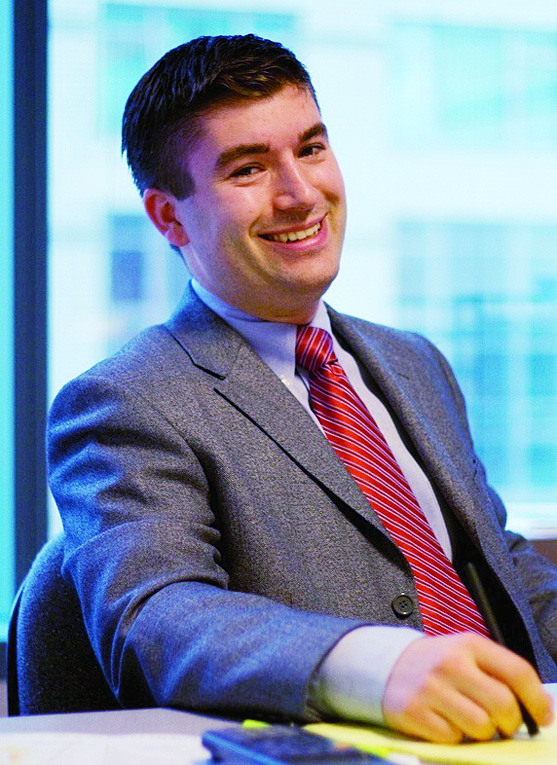A New Leader in the Oregon House
Open gallery

Jules Kopel Bailey BA ’01 canvassed Portland neighborhoods seven days a week during his 2008 bid for state representative of Oregon House District 42. He estimates he knocked on 10,000 doors in the space of five months, ratcheting up his efforts to 100 visits a day during the final leg of the campaign—all while holding down a full-time consulting job and hustling to raise money for the race. “Being on the campaign trail was literally the hardest thing I’ve ever done,” says Bailey, who lost 35 pounds in the process.
It was also one of the most rewarding.
“I represent the heart of inner eastside Portland, a hub of political and social advocacy and activism,” he says. “I made some lifelong friends on those doorsteps.”
He also fleshed out the core of his signature piece of legislation. In his first term, Bailey was co-chief sponsor of HB 2626, the Energy Efficiency and Sustainable Technology Act, which passed with strong bipartisan support and was signed into law by Governor Ted Kulongoski in July 2009.
The bill allows homeowners and businesses to secure long-term low-interest loans for energy efficiency and renewable energy projects, such as upgrading insulation and adding triple-pane windows and solar panels.
“One of my co-chief sponsors on HB 2626 was Tim Freeman of Roseburg,” says Bailey. “He’s a great guy who owns a gas station and isn’t concerned about climate change. But because he knew the bill would help people in his district economically, he worked with me to make it happen.”
That spirit of bipartisanship, civility, intelligent debate, and compromise in Salem has impressed Bailey.
“I can’t conceive of dealing with the power struggles I’ve seen over health care in Washington and at town hall meetings,” he says.
Bailey has been appointed vice chair of the House Revenue Committee. During the 2009 session, he served on four other committees: Transportation, Sustainability and Economic Development, Environment and Water, and Oregon Fujian Sister State.
A typical day for Bailey moves at breakneck speed.
When the legislature is in session, it goes something like this: up at 5 a.m., carpool to Salem to arrive by 7:30, start meetings at 7:45, go to morning committees, vote for bills on the floor at 10, take a 15-minute lunch at noon or eat during caucus, and then return for afternoon meetings and committees at 1 p.m. Most of Bailey’s meetings last about 15 minutes, so he can squeeze eight into two hours. He carpools back to Portland at 5:30, arriving at 7 p.m. At home, he responds to about 100 e-mails.
“The next morning, I get up and do it all over again,” he says. “It’s very intense, and there’s no room for error.”
When he’s not in Salem, Bailey juggles three jobs: he’s assistant majority leader for policy for the House Democratic caucus; he’s chief strategist for his reelection campaign; and he’s the principal consultant for Pareto Global, a company that assists clients with energy issues, land use, transportation, and economic impact analyses.
Bailey credits his rising career trajectory to the mentoring relationships he formed with professors while at Lewis & Clark, including Curtis Johnson, Pamplin Professor of Government; Cyrus Partovi BA’67, senior lecturer in social sciences; and the late Evan Williams, founder of the interdisciplinary Environmental Studies Program.
“I learned that there is more to environmental policy than just biology and chemistry,” he says. “People also need to be well versed in economics, politics, philosophy, and mathematics.”
Energized by his successful first year in office, Bailey says he intends to stay in state politics for the long term. On his future wish list are fostering world-class educational opportunities in Oregon and ending the state’s budget roller coaster.
“My best days are ones when I get a clear, tangible victory on a key piece of legislation,” he says. “The most challenging part of being a young representative is realizing that I can’t accomplish everything I want immediately. I’m learning to recognize the value of incremental victories and compromise.”
—by Pattie Pace
More L&C Magazine Stories
Lewis & Clark Magazine is located in McAfee on the Undergraduate Campus.
MSC: 19
email magazine@lclark.edu
voice 503-768-7970
fax 503-768-7969
The L&C Magazine staff welcomes letters and emails from readers about topics covered in the magazine. Correspondence must include your name and location and may be edited.
Lewis & Clark Magazine
Lewis & Clark
615 S. Palatine Hill Road MSC 19
Portland OR 97219

